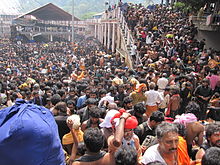
| Part of a series on |
| Hinduism |
|---|
 |
Makara Jyothi is a star worshiped by pilgrims at Sabarimala Temple in Kerala on Makara Sankranti every year. It is believed that the deity Ayyappan asserts himself as Makara Jyothi to bless his devotees.
Etymology[edit]
Makara (Sanskrit: मकर) is the name of a zodiac sign in Indian languages known as Capricorn in English. Jyoti means "light" in Sanskrit.
Popularity of the ritual[edit]
The huge crowd of pilgrims that witnesses the event has increased every year.[1] It is believed that 1.5 million devotees witnessed Makara Jyoti in 2010.[2][failed verification] The revenue collection during the Makaravilakku period was also higher compared to previous years. The total donations were Rs.720 million in 2008 against previous year’s Rs.723 million.[3]
Sabarimala stampedes and authenticity debate[edit]
In 1999 and 2011, two major human stampedes occurred on 14 January at Sabarimala, killing 53 and 106 people, respectively.[4][5][6] In 1999 the Justice T Chandrasekhara Menon committee that investigated the stampede refrained from going into the details of authenticity of Makara Jyothi. It stated that Makarajyothi is a matter of belief and could not be investigated. Justice Chanadrasekhara Menon had probed the veracity of Makara Jyoti during that time. He also appointed an advocate of the commission to witness it.[4]
The 2011 stampede occurred during an annual pilgrimage, killing 102 pilgrims and injuring more than 100.[contradictory] Amid a renewed debate after this stampede, Kerala High Court wanted to know whether or not Makara Jyoti is a man-made phenomenon, asking about the authenticity of the hallowed celestial light visible from Sabarimala. "A distinction has to be made between the Makaravilakku and Makara Jyothi. The Jyothi is a celestial star. Makarvilakku is lit [by people]," said the head of the Thazamon Thanthri family, Kantararu Maheswararu.[7] After this the Travancore Devaswom Board (TDB) said that it was known to most believers that it was a man lit-fire, but there was a Hindu belief behind it. "It is known to everybody that Makara Vilakku is a fire lit up by men at Ponnabalamedu and TDB also recognises this. But Makara Jyothi is a celestial star", TDB President M Rajagoplan Nair told reporters on 31 January 2011.[5]
References[edit]
- ^ "Sighting of 'Makarajothi' brings good luck and blessings". The Hindu. Chennai, India. 14 January 2006. Archived from the original on 29 January 2008.
- ^ "Pilgrims witness Makara Jyothi". Manorama Online.
- ^ "Sabarimala revenue put at Rs.102.52 crore". The Hindu. Chennai, India. 15 January 2010. Archived from the original on 18 January 2008.
- ^ a b "Makarajyothi: Court intervening after 11 years". Mathrubhumi English. 21 January 2011. Archived from the original on 1 February 2014. Retrieved 18 January 2014.
- ^ a b "Sabarimala's Makara Jyothi is man-lit: TDB". Times Of India. 31 January 2011. Retrieved 18 January 2014.
- ^ G. Mahadevan (15 January 2011). "Sabarimala stampede: toll rises to 102". The Hindu. Retrieved 18 January 2014.
- ^ "Kerala High Court's poser on 'Makarajyothi'". The Hindu. 20 January 2011. Retrieved 18 January 2014.